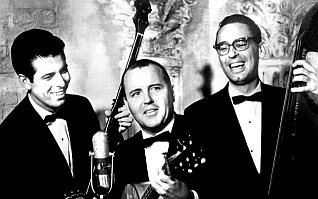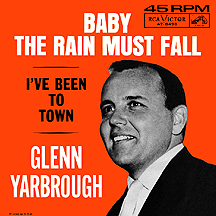GLENN YARBROUGH
Baby the Rain Must Fall
I'm not sure which was Glenn Yarbrough's greatest passion: singing...or sailing! Think I'll go with the latter. Examine the evidence and see if you agree. His interest in music came first, singing in church during his childhood in Milwaukee, Wisconsin and later in college when he happened to have Jac Holzman, future founder of folk music's Elektra Records, as a roommate. By the mid-'50s he was something of a wanderer, working for a time in Rapid City, South Dakota as a radio and TV personality, then as a folk singer in Greenwich Village. In 1957, a year or so ahead of the folk music boom that flourished when The Kingston Trio led the way, he recorded an album, Come Sit By My Side, for the strictly-folk Tradition label. After a stint in Aspen, Colorado at a night spot called the Limelite, he headed to California.
Yarbrough met Alex Hassilev and they began singing together, quite informally, in Los Angeles clubs. Lou Gottlieb made the rounds of both L.A. and the Bay Area; a multitasker before the word was common, he was never content to do the same thing for very long. Lou was a jazz pianist early on, but later backed up various folk acts as a bass player. The guy was funny too, in his own mind at least. He did standup comedy in the late '50s at San Francisco's Hungry i nightclub and sang with regulars The Gateway Singers while taking on emcee duties, which he maneuvered with gusto. He also did musical arrangements for Kingston Trio sessions as a legit "day job." In the summer of 1959, Gottlieb spotted Hassilev and Yarbrough singing together and, older and purportedly wiser, he suggested the three work together as demo singers. But it became apparent they were destined for something greater when they realized how well their personalities, and voices, suited one another.
Naming themselves The Limeliters after the club in Aspen, they made the rounds of folk venues and wound up playing the Hungry i that summer (in the wake of the Kingston Trio's standing-room-only run there). Holzman was well established with Elektra by this time and their self-titled first album was released on the label in 1960. Then RCA Victor locked them up with a lucrative contract; two early RCA albums, Tonight in Person and The Slightly Fabulous Limeliters, were huge sellers in 1961 and '62. The group was never a singles act per se, and the lack of radio play may have kept them from approaching the mainstream success of the Kingston Trio or longevity of The Brothers Four. Their best-known song was the group's only single to crack the charts: "A Dollar Down," humorously protesting the "buy now, pay later" mentality of many Americans, had a brief burst of popularity in the spring of '61.
Commercial endorsements were not beneath the Limeliters. In 1961 they did a series of spots for L&M cigarettes and later began a long association with Coca Cola, recording the much-exposed "Things Go Better With Coke" that is perhaps the most famous slogan in the soft drink's long history (a century-plus and counting). The ads, in fact, with Yarbrough's lead vocals, continued playing on radio and television well after he had left the group. His departure came in late 1963, not long after the three had recorded the opening song for the John Wayne film McClintock, "Love in the Country" (written by Frank DeVol with lyrics by "By" Dunham, who later invaded households every week with his unavoidably catchy lyrics for the NBC-TV series Flipper).

The course of Glenn's career took a turn when a small plane the group had chartered crashed near Provo, Utah on December 12, 1963. The plane was ripped apart, though everyone on board survived with nothing worse than minor injures. Glenn's were the most serious; he was treated for a scalp laceration. Shaken by the incident, he began to reassess his priorities. Having dreamed of sailing around the world, he decided to do just that, despite the challenges associated with such a venture. The Limeliters replaced him with Ernie Sheldon and continued making records before calling it quits for good (or so they figured at the time) in 1965.
Hassilev pursued an interest in acting (begun back in '59 when he performed two songs in the Roger Corman film A Bucket of Blood) and won a part in the 1966 hit The Russians Are Coming! The Russians Are Coming! in addition to a few small TV roles. Gottlieb purchased Morning Star Ranch in Sebastopol, some 60 miles north of San Francisco, turning it into a commune where many Bay Area hippies took up residence around the time of 1967's "Summer of Love." He also did some acting, appearing as a guru (art imitates life!) in I Love You, Alice B. Toklas, the 1968 film starring Peter Sellers; he was called upon to play a guru-type again in Blume in Love five years later. Yarbrough even did a little TV acting while making his plans to sail into the sunset, appearing in a November 1964 episode of Wagon Train as, predictably, a guitar player.
RCA Victor convinced Yarbrough to postpone his worldwide journey, if only for a little while, in order to see if he could be successfully promoted as a solo act. At about this time, Robert Mulligan directed a film based on Horton Foote's play The Travelling Lady. Foote, an Oscar winner for adapting Harper Lee's To Kill a Mockingbird for the big screen (also directed by Mulligan), fashioned the screenplay for his own story this time, changing the title to "Baby the Rain Must Fall." The hit film starred Steve McQueen and Lee Remick. The title song, written by Elmer Bernstein and Yarbrough's Limeliters replacement Ernie Sheldon, fell into Glenn's lap (possibly due to Ernie's involvement). David Gates (later lead singer of Bread) arranged the session. The film was released in January 1965 and Yarbrough's perfect-fit performance of the song was a hit, saturating the airwaves throughout the spring months.
Another single, "It's Gonna Be Fine," and several follow-up albums delayed Glenn's plans to see the world by five years. When he finally set sail, he was hooked. Preferring long distance sailing over the recreational weekend type, he logged more than 40 thousand nautical miles over four decades, crossing a few oceans in the process. His music career continued as well, but as a secondary interest, a spirited diversion that also served to keep his loyal fans happy in between sailing trips, some of which stretched over a few years' time. The Limeliters reunited in the 1970s and he joined them for several years (after which they kept at it, with occasional new members, under Hassilev's leadership). In his later years you might have been able to catch a Glenn Yarbrough performance, but you'd have had more luck finding him on a boat somewhere with nothing but salt water for hundreds of miles in any direction.


